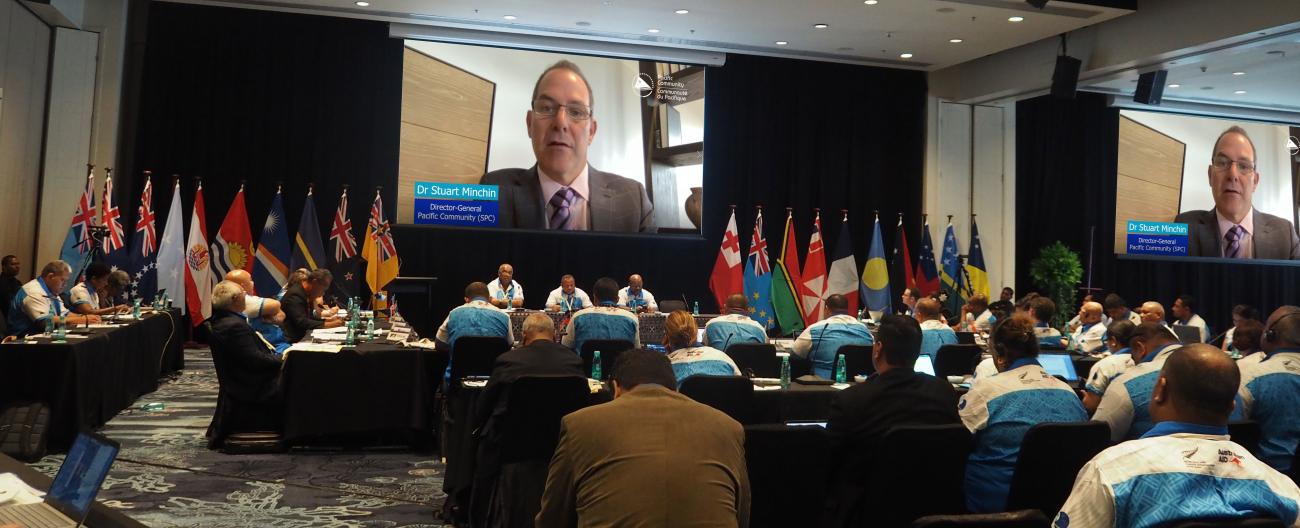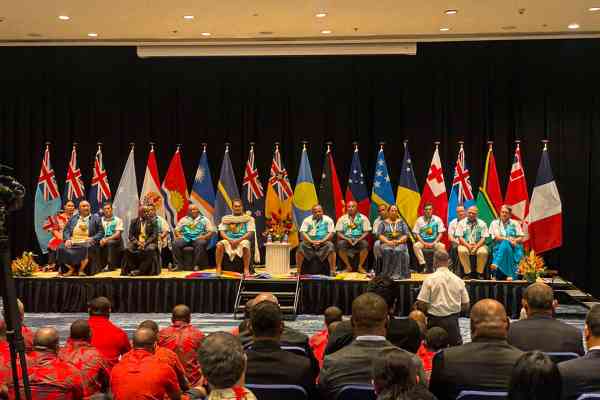Inaugural Pacific Disaster Risk Reduction Ministers Meeting, 14-16th September 2022 - Nadi, Fiji
Opening Remarks by Dr. Stuart Minchin, Director-General, Pacific Community (SPC)
Chair, Honourable Inia Seruiratu, Minister for Rural & Maritime Development & Disaster Management, Fiji
Honourable Ministers
Distinguished Delegates
Ladies and Gentlemen,
It is indeed an honour for the Pacific Community to be co-organising with the Pacific Islands Forum Secretariat this inaugural Pacific Disaster Risk Reduction Ministers Meeting hosted by the Government of Fiji.
We are here because of our shared vision that our investments in resilience can actively contribute to the wellbeing, growth, and sustainable development of our region, as encapsulated in the Framework for Resilient Development in the Pacific.
Today has been a long time coming. I would like to recognise all the champions of disaster risk management in the Pacific who have advocated to bring together disaster risk management officials, partners, and honourable Ministers together this week.
Our honourable Ministers, your political leadership and commitment to the work led by national officials is needed, more so now given the complexities and compounding impacts of COVID, climate change and disasters on communities and development in the region.
Through our work, we’ve invested in improving data to help countries determine whether to avoid, reduce, transfer or accept risk. This data alongside support of many of the partners here today also provides a genuine basis for science to action, necessary actions if we want to ensure a truly resilient Blue Pacific region for future generations.
So why are these areas so critical to resilience in the Pacific?
Improvements in data capability has resulted in better access to baseline data, analysis, and application. High resolution topographic data doesn’t just tell us where our new coastlines are as a result of sea level rise, it can also help us understand if and how groundwater aquifers can be compromised, determine the implication on food security and by extension where and how we live as communities to increase our safety.
Through numerical models we are also able to determine vulnerable coastlines, exposed communities, and assets. This information also allows us to better prepare through the development of effective multi-hazard early warning systems and ensures long-term town planning is responsive to our changing environment.
Examples in our region of effective data being used to drive action is represented through countries such as the Marshall Islands and Tuvalu who have used these baselines to assess current and future risks.
This has been possible through open data sharing and knowledge sharing across the region. We will hear this week how these data capabilities have informed investments which include multi-hazard early warning systems, infrastructure protection measures and improvements to risk governance.
I am also pleased to share that Digital Earth Pacific, an initiative that the Pacific Community is currently working on, aims to harness cloud computing using readily available satellite borne data combined with detailed country information to develop decision ready products that are routinely updated. These can be used for disaster response planning as the situation unfolds, show long term impacts of slow onset events like droughts, and track illegal fishing, to name a few. We have started testing these applications in several countries and expect to roll this out as a regional service.
Our scientific innovations are also helping to understand the specific plight of atoll nations and vulnerable countries to disaster. The eruption of Hunga-Tonga-Hunga-Ha’apai earlier this year “rang the earth” and the resulting tsunami and ashfall devastated the people of Tonga.
The implications on Tonga’s economy are over 90million USD in damages, the equivalent of 18.5 percent of the country’s gross domestic product and around the same amount of ODA received in the two preceding years. The events leading up to and of the tsunami were extraordinary and has influenced tsunami preparedness and early warning globally.
This disaster exemplifies the increasing complexities faced by Pacific nations. As the recovery effort began, Tonga had its first reported community transmission of COVID-19. The compounding nature of disaster means understanding vulnerability and risk while finding ways to action our resilience is more important now for your communities, your nation, and our Blue Pacific region.
My final message to you all here today is focused on the effective translation of science to action. COVID may have highlighted our vulnerabilities, however, it also made us refocus efforts inward to strengthen national capabilities and recognise areas where growth is needed. Partners need to recognise that resilience needs to be anchored in sovereignty, localisation, trust, accountability, and interoperability.
The Pacific Community is your organisation, we are here in the region, to work with you to develop and implement Pacific solutions that will build, prepare, plan and strengthen capacity and capability to address the impacts of disasters and climate change.
I look forward to working with you over the coming weeks and thank you for the time this morning on this momentous and important juncture towards a more resilient and collective Blue Pacific.

